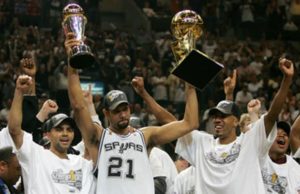
Tim Duncan IS Still Setting the Bar
Evaluating the Greatest NBA Players in the Post-Jordan Era
With the news last week of Shaquille O’Neal’s retirement from the Boston Celtics and in the mist of an entertaining NBA Finals, I thought this would be an appropriate time to open up a debate here at theLeftAhead.com about the best NBA player in the post-Michael Jordan era. I don’t mean since 2003, when Jordan limped off of the court as a Washington Wizard. I mean the true Post-Jordan era, since his retirement from the Chicago Bulls in 1998.
As we speak, Dirk Nowitzki and LeBron James are doing battle trying to seize an opportunity to erase their names from the list of best NBA players to never win a championship. But the question at hand is who has been the greatest player in the NBA since 1998. For the purpose of being thorough, I will open up the debate by ranking every player worthy of consideration from this era. Needless to say there are only three players on this list that someone could make a legitimate argument for being the greatest. They are, in no particuliar order, Shaquille O’Neal, Kobe Bryant, and Tim Duncan. So please, do not come on theLeftAhead.com and make an argument that any player besides these three is the greatest of the era because we will be forced to put you in the penalty box for two weeks.
Let me begin by saying that my list is not subjective. It is based on a simple mathematical formula for determining NBA greatness. For the sake of keeping things entertaining, I will unveil my list first and then present the mathematical formula that determined it afterward. Let the blood boiling begin.
Greatest NBA Players in the Post-Jordan Era
18th – Jason Kidd
17th – Derrick Rose
16th – Allen Iverson
15th – Dirk Nowitzki
14th – Ray Allen
13th – Steve Nash
12th – LeBron James
11th – Kevin Garnett
10th – Pau Gasol
9th – David Robinson
8th – Chauncey Billups
7th – Paul Pierce
6th – Dwyane Wade
5th – Manu Ginobili
4th – Tony Parker
3rd – Kobe Bryant
2nd – Shaquille O’Neal
1st – Tim Duncan
Before you start typing your profanity laced responses about me being an idiot, let me lay out a couple of clarifications. First, this is a ranking of the “greatest” players of the era, not necessarily a ranking of the “best” players of the era. Obviously, a ranking of the “best” players of the era would have LeBron James much higher than Tony Parker, for example. I define greatness by winning championships and so my mathematical formula is heavily weighted towards players who have won rings. Secondly, whether my formula skews Chauncey Billups ahead of Dirk Nowitzki, for example, is irrelevant to the task at hand. As I stated before, there are really only three players in the conversation and I think that my formula gives a good perspective on how to determine between the true great players of the era. Consequently, I will show later that my formula puts Michael Jordan vastly ahead of all three great players from this era which should add some levity to the debate and perhaps muffle those of you who are foolish enough to argue Bryant is better than Jordan. So without further adieu, let me present my mathematical formula for determining NBA greatness. The complexity of this formula wll shock you.
1 point for each NBA MVP award won (regular season)
2 points for each NBA Championship won
2 points for each NBA Finals MVP won
According to the formula,
18th – Jason Kidd = 0 points (I put Kidd on the list because he was the only player I could think of in the era that should be on the list of greatest players but has not earned any points according to the formula. Perhaps that will change in the next week.)
17th – Derrick Rose = 1 point (2011 NBA MVP)
16th – Allen Iverson = 1 point (2001 NBA MVP)
15th – Dirk Nowitzki = 1 point (2007 NBA MVP)
14th – Ray Allen = 2 points (2008 NBA Champion)
13th – Steve Nash = 2 points (2005, 2006 NBA MVP)
12th – LeBron James = 2 points (2009, 2010 NBA MVP)
11th – Kevin Garnett = 3 points (2004 NBA MVP / 2008 NBA Champion)
10th – Pau Gasol = 4 points (2009, 2010 NBA Champion)
9th – David Robinson = 4 points (1999, 2003 NBA Champion – I put Robinson on the list for work done in the post-Jordan era, his career point total under this formula is actually 5 [1995 NBA MVP])
8th – Chauncey Billups = 4 points (2004 NBA Champion / 2004 NBA Finals MVP)
7th – Paul Pierce = 4 points (2008 NBA Champion / 2008 NBA Finals MVP)
6th – Dwyane Wade = 4 points (2006 NBA Champion / 2006 NBA Finals MVP)
5th – Manu Ginobili = 6 points (2003, 2005, 2007 NBA Champion)
4th – Tony Parker = 8 points (2003, 2005, 2007 NBA Champion / 2007 NBA Finals MVP)
3rd – Kobe Bryant = 15 points (2008 NBA MVP / 2000, 2001, 2002, 2009, 2010 NBA Champion / 2009, 2010 NBA Finals MVP)
2nd – Shaquille O’Neal = 15 points (2000 NBA MVP / 2000, 2001, 2002, 2006 NBA Champion / 2000, 2001, 2002 NBA Finals MVP)
1st – Tim Duncan = 16 points (2002, 2003 NBA MVP / 1999, 2003, 2005, 2007 NBA Champion / 1999, 2003, 2005 NBA Finals MVP)
Here are a couple more notes about my ranking system. First, I did not include ranking role players, so that is why Derrick Fischer, Bruce Bowen, Robert Horry, Lamar Odom, ect. are not on the list. Every championship team of the era (with the exception of the 2004 Detroit Pistons) has had either two or three “great” players, so those are the players I ranked. Secondly, players with tie scores I made subjective determinations about their resumes to decide who I ranked higher. For example, in my opinion Shaq is second and Kobe is third because Shaq was the dominant player for three championships and a side kick on only one whereas Kobe was the dominant player on only two championships and the sidekick on three.
You could argue that Shaq should be tied with Tim Duncan in first place based on the point system because he was robbed of the 2005 NBA MVP which was given to Steve Nash. I would respond that you could make the same argument to give Tim Duncan two more points for the 2007 NBA Finals. Duncan was still the dominant player for the Spurs in 2007 and the only reason Tony Parker won the NBA Finals MVP trophy is because Cleveland did not put up a fight and got swept. The bottom line is that Tim Duncan has been the dominant player in winning four titles, Shaq has been the dominant player in winning three (Dwyane Wade was in 2006) and Kobe has only been the dominant player in winning two (Shaq was in 2000, 2001, 2002). This is why Tim Duncan is still setting the bar for greatness in the post-Jordan era and the formula bares it out.
By the way, for that perspective I alluded to earlier. Shaq is now retired with his 15 points under this formula. Tim and Kobe have a long way to go to try and get in the Michael Jordan conversation of greatness. Here is an evaluation of Michael Jordan based on this formula.
Michael Jordan = 29 points (1988, 1991, 1992, 1996, 1998 NBA MVP / 1991, 1992, 1993, 1996, 1997, 1998 NBA Champion / 1991, 1992, 1993, 1996, 1997, 1998 NBA Finals MVP)
Hence, the phrase the post-Jordan era.
Let the official theLeftAhead.com debate begin.
Featured & Headline Image Source: Complex




Pingback:Four Behind | theLeftAhead